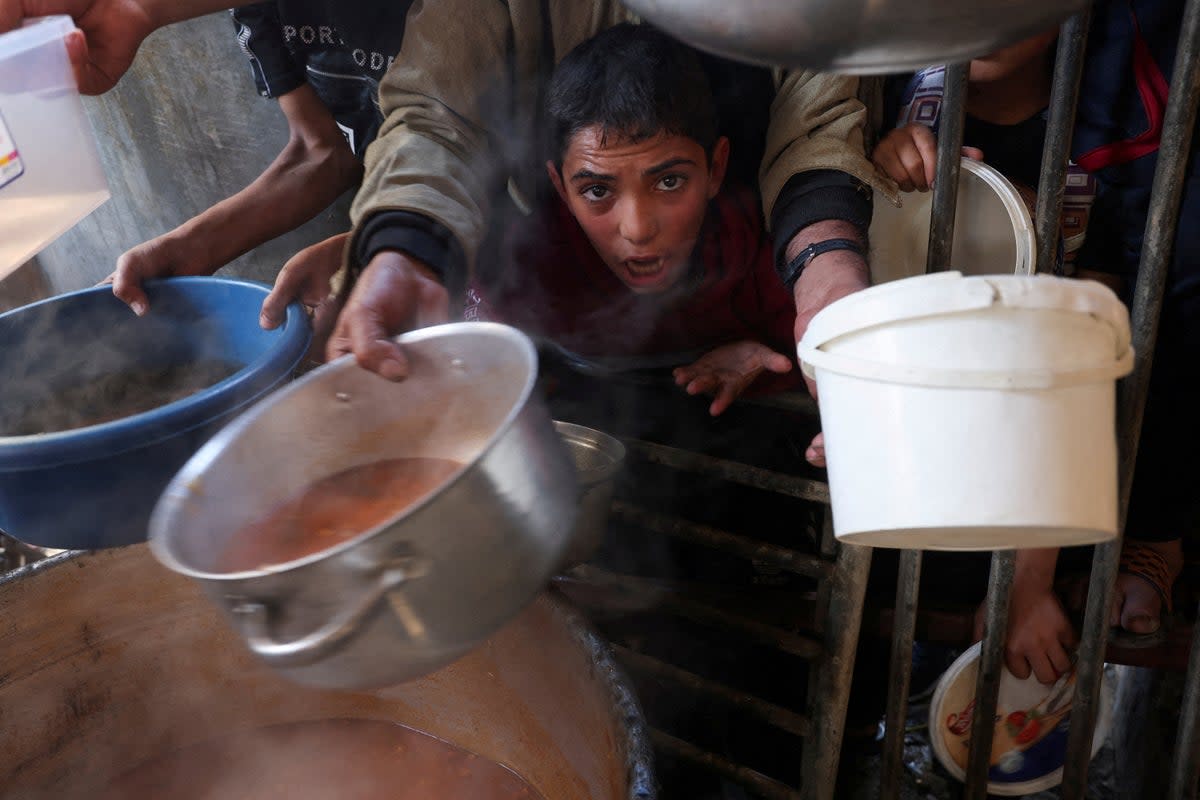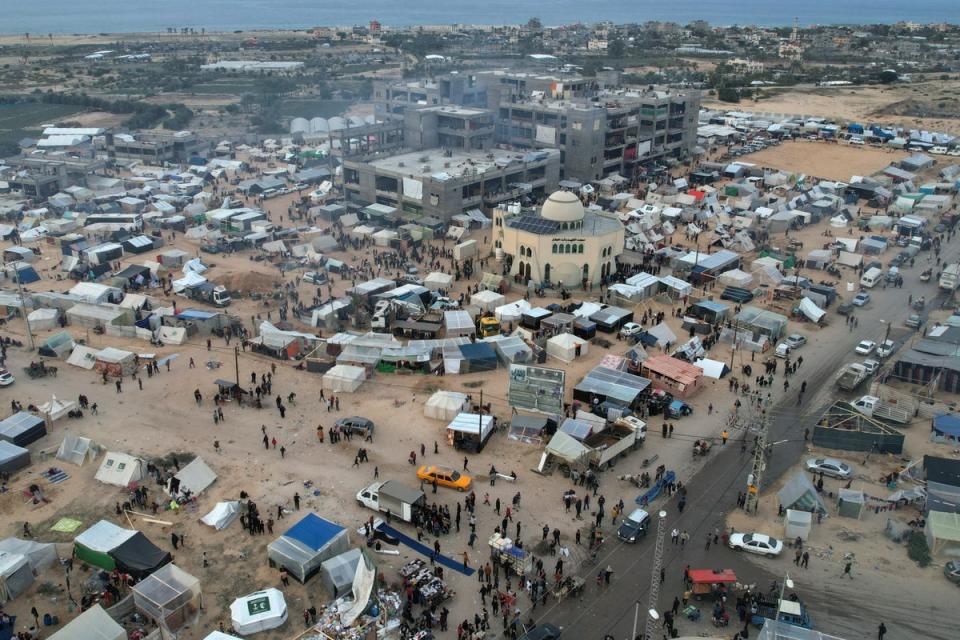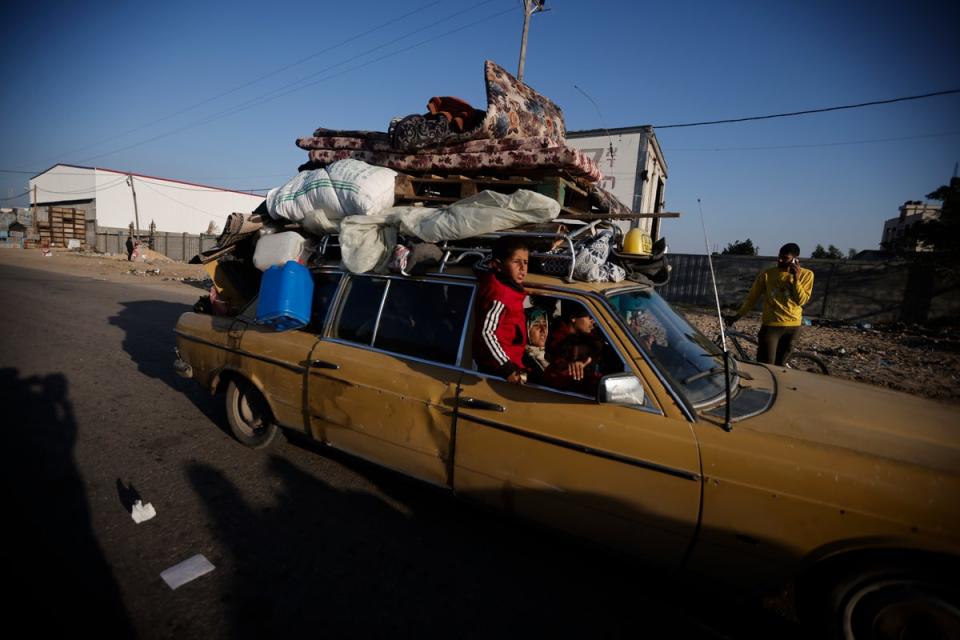Struggling to survive in Gaza: ‘If war does not kill my children, hunger will’

For three days, we’ve not found bread to feed my children. I’m still trying to find flour to make bread for them,” says Fatima Mohammad, a 30-year-old mother of four children, one of whom is diabetic.
“I cannot find food that is suitable for her and she is forced to eat things that she is forbidden from eating. She has lost a lot of weight.”
Originally from a town east of Khan Younis, southern Gaza, Fatima and her family have been displaced multiple times since Israel’s war against Hamas in Gaza started. As Israeli forces approached Khan Younis over the weekend, she was forced to flee again, this time finding refuge in a school near Rafah.
Israel started its aerial bombardment of Gaza in the wake of an attack by Hamas inside Israel on 7 October that killed 1,200 people and saw another 240 taken hostage. Health officials in Hamas-run Gaza say more than 17,000 people have been killed since Israel’s military operations began, with ground operations in recent weeks starting in the north and recently moving south. This has been backed by a blockade of Gaza, leaving supplies of fuel, food, water and medicine in short supply.
After the Israeli military issued evacuation warnings to thousands of people around Khan Younis – before pounding the area with bombs – huge numbers streamed south, piling pressure onto the supplies that are left.
The UN has warned a hunger crisis across Gaza is intensifying and threatens to overwhelm the civilian population, with nowhere near enough aid getting into the territory. The UN Palestinian refugee agency (UNRWA) said 1.9 million people – 85 per cent of Gaza’s population – had been displaced, its shelters were four times over capacity, and there was not enough aid to meet “the overwhelming needs”.
More than one-third of the internally displaced people in Gaza are suffering from “severe levels of hunger”, according to the World Food Programme (WFP). In northern Gaza, nearly half of the people are suffering from “severe levels of hunger”, with nine in 10 going at least one full day and night without food.

“If our children do not die from war, they will die from disease and hunger,” says Asmaa Alustath, a 34-year-old mother of three from Gaza City in the north of the territory, where Israeli military operations against Hamas were focused before the recent push south.
Many people are being forced to burn rubbish as fuel to cook meals. Some are scavenging in bombed-out buildings for cans of food, packets of rice, or cereal bars. Fights are breaking out in queues for aid. Prices for the little food that is available have skyrocketed.
“I’ve lost about 15kg of weight since the beginning of the war,” says Ibrahim Al-Nawajha, who has been displaced further south four times since 7 October. First to Nuseirat [central Gaza Strip], then to Deir al-Balah, then to Khan Younis, and finally to Rafah. “I almost became anaemic,” he says.
For some, it’s not only the shortage of food that’s causing weight loss. It’s the physical labour that they are having to do to carry out basic daily tasks. A shortage of fuel means access to vehicles is limited, meaning many are having to walk long distances to obtain water or food.
If, like Fatima and Ibrahim, they are displaced from their homes, they are often forced to walk miles to new shelters while carrying their belongings on their backs.
Across Gaza, sanitation systems have been disrupted, meaning that in some areas, sewage is seeping through the streets. This has caused a high risk of contamination – as well as risking the emergence of serious waterborne diseases such as cholera and typhoid.

Many in Gaza’s crowded south are surviving on aid that was delivered last week, during the seven-day truce which collapsed last Friday.
Israel says it is working to increase the number of aid trucks allowed into the Gaza Strip. The United Nations aid chief Martin Griffiths said on Thursday there were “promising signs” that the Kerem Shalom crossing from Israel into Gaza could soon be opened. The crossing was used to carry more than 60 per cent of the truckloads going into the territory before this conflict. Aid currently being allowed into Gaza comes through the Rafah crossing on the Egyptian border.
The British foreign secretary, David Cameron, said on Thursday that Israel must “behave differently” in southern Gaza than it did in the north of the strip. Lord Cameron told CNN that he agreed with the US secretary of state Antony Blinken’s comments that Israel cannot repeat what happened in the north in terms of civilian harm.
Meanwhile, the head of the medical charity Medecins Sans Frontieres (MSF) said that the need is desperate.
“My people on the ground keep updating me on the situation, and I can tell you that it has gone far beyond the humanitarian crisis,” Dr Christos Christou, told reporters in Geneva.
“It is a humanitarian catastrophe. It is a chaotic situation,” he said.


